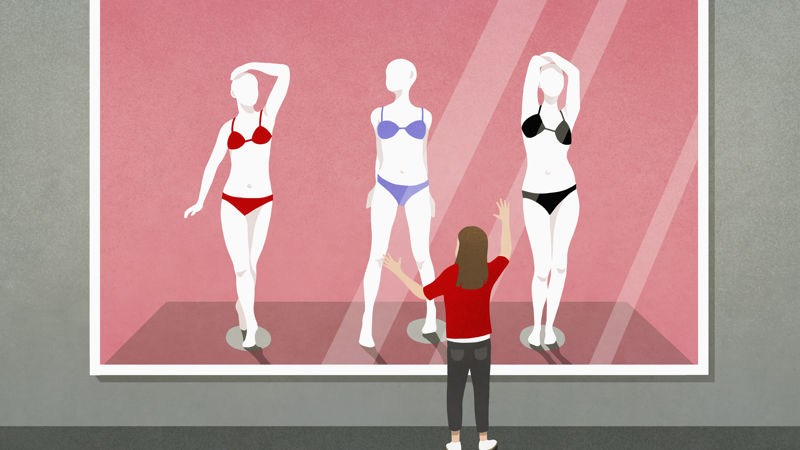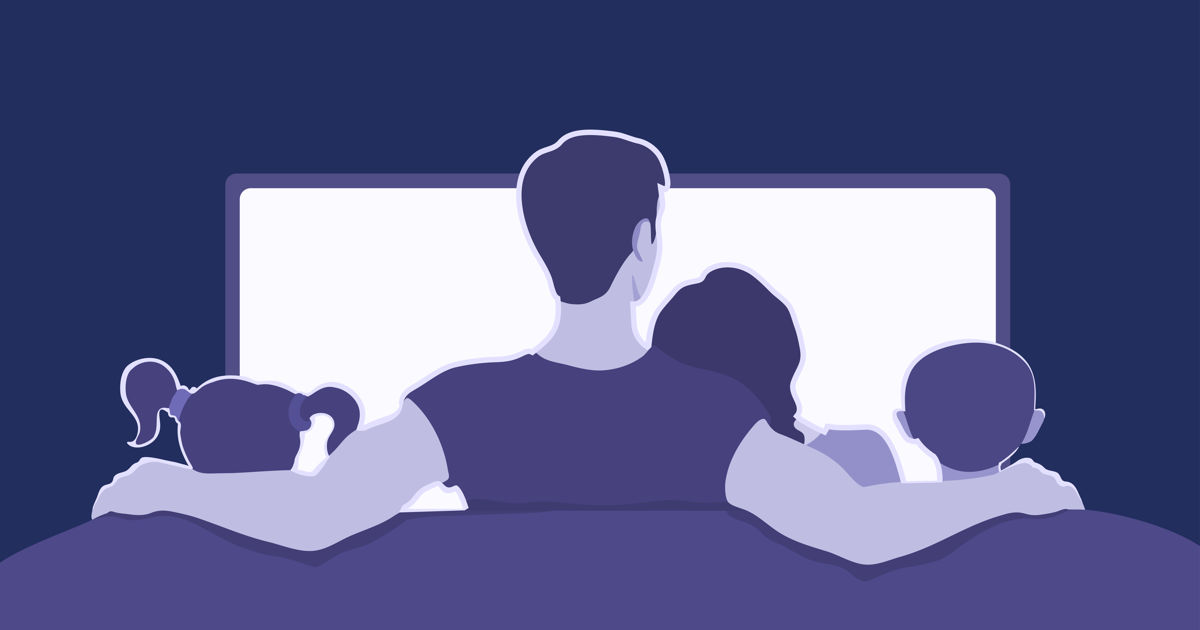How Uncommon and ITV got Britain talking about mental health
In 2019 ITV and Uncommon Creative Studios launched a mental wellness campaign that was bold, brave and hugely successful. Its Britain Get Talking initiative has helped alter how the UK's TV-watching public understands - and deals with - mental health issues. Here, Clare Phillips, Director of Social Purpose at ITV, and Catherine Peacock, Managing Partner & Head of Account Management at Uncommon, discuss the campaign and how it was brought to fruition.
What compelled ITV to launch its mental wellness campaign?
Phillips: Social purpose at ITV is central to our More Than TV strategy. It helps position ITV as a creative force which does more than entertain – it makes a difference to British culture in a way that global competitors cannot. With the huge reach of our platforms, much-loved shows and creative talent, ITV has a unique ability to drive meaningful change by reflecting and shaping culture. We had already been doing powerful work in the wellness space, and felt it was time to tackle mental health as well as physical health. We researched charities and then approached them to be part of the initiative, to help provide insight across every step of the process as well as amplify the message to a wider audience.
We had already been doing powerful work in the wellness space, and felt it was time to tackle mental health as well as physical health.
Peacock: ITV has both exceptional ability and opportunity to speak to and influence our culture in the UK. In partnership with them, we were determined to coordinate a long-term campaign initiative designed to leverage this and lead to positive behaviour change across the country. Today the subject of mental health is high on the agenda and, of course, it is something we are all increasingly concerned with. However, this is not a new trend and, over the past few decades, mental health challenges have been rapidly on the rise.
In 2019, anxiety and depression in children had risen by 48% since 2004 and, furthermore, the charity Mind advised that in any given year one in four of us would be affected by a mental health problem. Our NHS was under significant pressure and lacked the necessary resources to tackle this growing crisis. It is a complex subject matter, and one that many campaigns, such as CALM’s Project 84, have done a great job in raising awareness around the horrifying scale of the challenge.
Credits
powered by
- Agency Uncommon/London
- Production Company Pulse Films/London
- Director Nez
-
-
Unlock full credits and more with a Source + shots membership.
Credits
powered by
- Agency Uncommon/London
- Production Company Pulse Films/London
- Director Nez
- Editing Speade
- Grade Raised By Wolves
- Audio Post Soundtree Music
- Producer David French
- Editor Rich Woolway
- Edit Producer David French
- DP Harry Wheeler
- DP Spike Morris
- Colourist Vic Parker
- Post Producer Jon Hollis / (Post Producer)
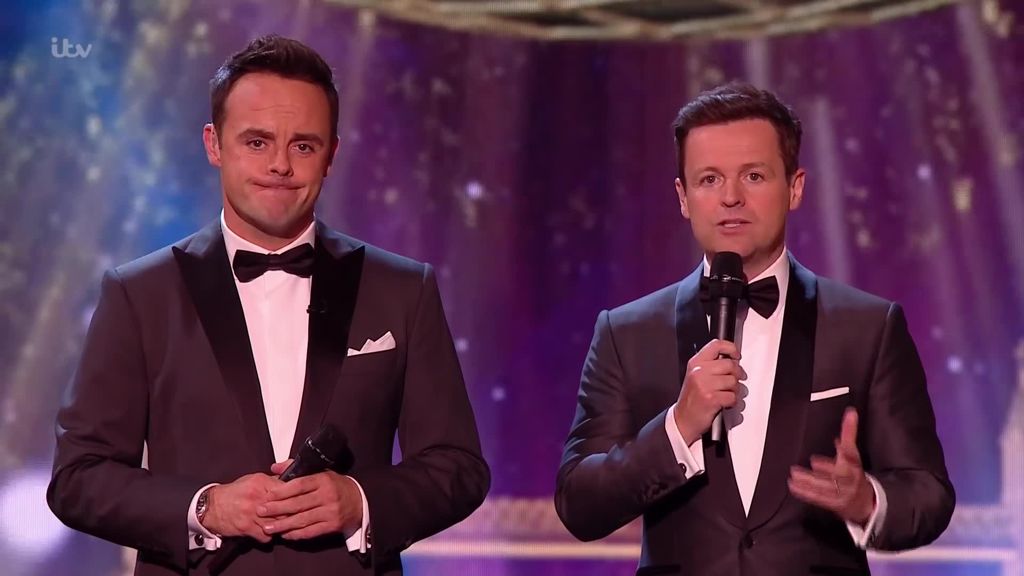
Credits
powered by
- Agency Uncommon/London
- Production Company Pulse Films/London
- Director Nez
- Editing Speade
- Grade Raised By Wolves
- Audio Post Soundtree Music
- Producer David French
- Editor Rich Woolway
- Edit Producer David French
- DP Harry Wheeler
- DP Spike Morris
- Colourist Vic Parker
- Post Producer Jon Hollis / (Post Producer)
Above: The launch of ITV's Britain Get Talking campaign in 2019.
Can you tell us more about the wider campaign?
Phillips: Right from our initial launch in October 2019, we knew that Britain Get Talking was powerfully resonating with people across the country. 2.8 million people (three times our target goal) said they had started a conversation with their children, family or friends and had a better quality of conversation as a direct result of the campaign. When the pandemic hit, just five months later, we felt a responsibility to act quickly and our year of Covid-19 campaigning has built on that success. We have reached 70% of the UK population and, just a few months into the pandemic, had driven a further 6.4m conversations.
We felt a stark responsibility to support our charity partners whose services were more in demand than ever before and, simultaneously, whose income was hit by lockdown.
Peacock: It is vital to us that Britain Get Talking remains insightful and reflective of how people are truly feeling during this extremely challenging period. To that end, we are constantly adapting and tweaking our messaging to ensure that we get the tone and, more fundamentally, the advice right. Throughout the pandemic, we’ve launched multiple campaigns that tapped in to the national context - but may not necessarily work for today. For example Clap From Our Carers aired after the weekly Thursday moment - a clap-back tribute from NHS staff to us for staying at home despite how tough that was on our mental health. Additionally, our text-based Conversations ads in the face of ever-changing social distancing rules encourage us to simply book ‘virtual drinks’, if that’s what it takes - and hopefully soon that message will also be a thing of the past!
Phillips: Furthermore, in October 2020, one year on from launch, we felt a stark responsibility to support our charity partners whose services were more in demand than ever before and, simultaneously, whose income was hit by lockdown (closure of shops, lack of fundraising activities, sponsored events etc). As a result, ITV launched a fundraiser for World Mental Health Day to help support the vital helplines provided by Mind, YoungMinds, SAMH and CALM. Inspired by the campaign, the UK Government pledged an additional £1 million to support mental health helplines, announced on air, during the final of Britain’s Got Talent.
Credits
powered by
- Agency Uncommon/London
-
-
-
-
Unlock full credits and more with a Source + shots membership.
Credits
powered by
- Agency Uncommon/London
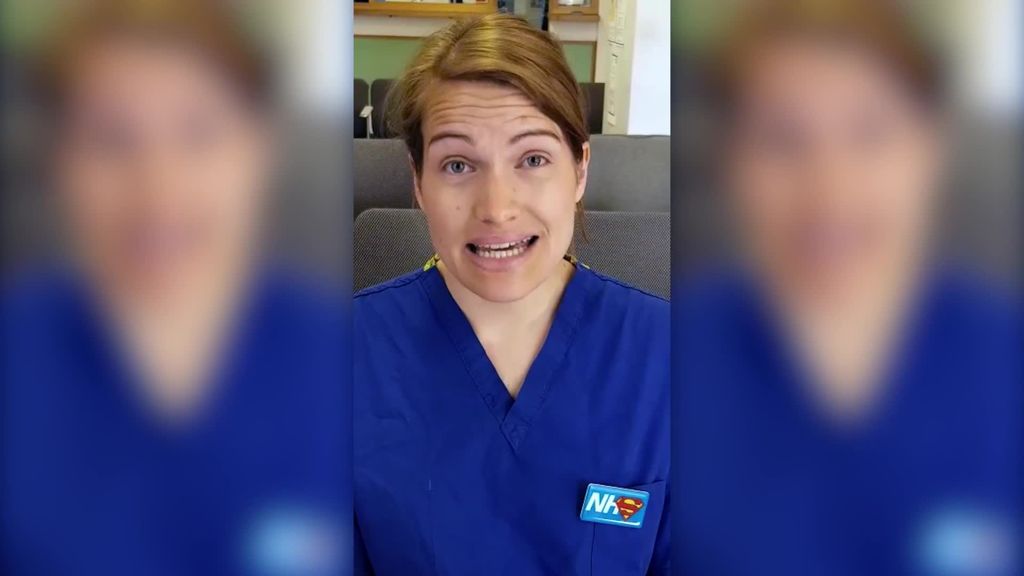
Credits
powered by
- Agency Uncommon/London
Above: The campaign message released after the Thursday, 8pm, Clap for Carers initiative that was instigated during lockdown in the UK in spring 2020.
How did Uncommon hit upon the idea for Britain Get Talking?
Peacock: Historically, mental health campaigns have focused on two key areas: firstly, raising awareness of the very concept of mental health and, secondly, highlighting the serious challenges facing society. For example, the rising rates of male suicide. Our objective was to influence positive behaviour change. We wanted to try and help viewers before things had become bleak or required serious medical support from experts, charities and the NHS.
Our hope was to inspire viewers to start thinking of their mental health, just as they do their physical health, i.e. taking care on a daily basis. There are five proactive steps we can all be taking to improve our mental wellness that the charities and NHS formally recognise; the first of these is to connect with other people; talking and listening is proven to reduce anxiety.
We so often spend time together watching TV and simultaneously scrolling through our devices, but we are not connecting with our children via quality conversation.
The ambition was to disrupt in a powerful way and encourage families to ‘tune back in to the story in your living room’. It is a truth that we so often spend time together watching TV and simultaneously scrolling through our devices, but we are not connecting with our children via quality conversation. So, we asked hosts Ant and Dec to pause their show and create the space to talk. A stark, uncomfortable, awkward long silence took place - the antithesis of what a viewer expects from an action-packed entertainment show. It was a creative risk for the broadcaster. It had never been done before and flew in the face of all instincts as entertainers. However, to successfully land a powerful and emotional point with viewers, we couldn’t play by the rules. We needed our audience to really experience something. The Archbishop of Canterbury, Justin Welby, wrote a piece in The Guardian stating “interrupting prime time TV to talk about mental health would have been unthinkable only a generation ago”.
Credits
powered by
- Agency MullenLowe/Boston
- Production Company m ss ng p eces
- Director Jared Knecht
-
-
Unlock full credits and more with a Source + shots membership.
Credits
powered by
- Agency MullenLowe/Boston
- Production Company m ss ng p eces
- Director Jared Knecht
- Chief Creative Officer Mark Wenneker
- Executive Creative Director Tim Vaccarino
- Executive Creative Director Dave Weist
- Executive Creative Director Scott Hayes
- Group Creative Director Scott Stripling
- Creative Director Enrique Camacho
- Creative Director, Digital and Social Dustin Johnson
- Associate Creative Director Jennifer MacFarlane
- Associate Creative Director Cody Dummer
- Senior Copywriter Tara Nelson
- Associate Creative Director Allie Hughes
- Executive Director of Production Integrated (HP) Lisa Gatto Setten
- Director of Production Broadcast (HP) Zeke Bowman
- Senior Producer Vera Everson
- Producer Content Abbey Daniel-Green
- Art Director Britney Drotleff
- Copywriter Vanessa de Beaumont
- Executive Producer Brian Smith
- Animator Ryan Dight
- Animator Andrew Lee
- Colorist James Tillett
- Producer Jenna Gabriel
- VFX Supervisor Rob Walker
- VFX Producer Carlos Zalapa
- Sound Design/Mixer Tom Jucarone
- Producer Alicia Rodgers
- Chief Creative Director Andrew Sherman
- Executive Creative Director Aaron Kotler
- Composer/ Executive Creative Director Timothy Kvasnosky
- Managing Director Ian Jeffreys
- Assistant Editor Josh Nowlan
- Managing Director/ Executive Producer Melissa Mapes
- Editor Alex Pirrone
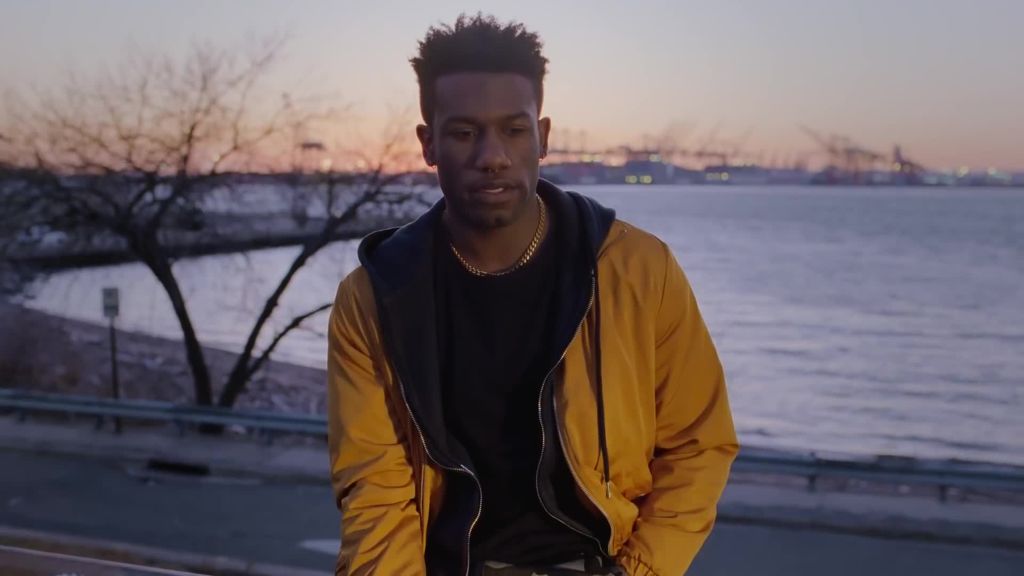
Credits
powered by
- Agency MullenLowe/Boston
- Production Company m ss ng p eces
- Director Jared Knecht
- Chief Creative Officer Mark Wenneker
- Executive Creative Director Tim Vaccarino
- Executive Creative Director Dave Weist
- Executive Creative Director Scott Hayes
- Group Creative Director Scott Stripling
- Creative Director Enrique Camacho
- Creative Director, Digital and Social Dustin Johnson
- Associate Creative Director Jennifer MacFarlane
- Associate Creative Director Cody Dummer
- Senior Copywriter Tara Nelson
- Associate Creative Director Allie Hughes
- Executive Director of Production Integrated (HP) Lisa Gatto Setten
- Director of Production Broadcast (HP) Zeke Bowman
- Senior Producer Vera Everson
- Producer Content Abbey Daniel-Green
- Art Director Britney Drotleff
- Copywriter Vanessa de Beaumont
- Executive Producer Brian Smith
- Animator Ryan Dight
- Animator Andrew Lee
- Colorist James Tillett
- Producer Jenna Gabriel
- VFX Supervisor Rob Walker
- VFX Producer Carlos Zalapa
- Sound Design/Mixer Tom Jucarone
- Producer Alicia Rodgers
- Chief Creative Director Andrew Sherman
- Executive Creative Director Aaron Kotler
- Composer/ Executive Creative Director Timothy Kvasnosky
- Managing Director Ian Jeffreys
- Assistant Editor Josh Nowlan
- Managing Director/ Executive Producer Melissa Mapes
- Editor Alex Pirrone
Above: Burger King's 2019 spot was criticised for its approach to mental health.
Earlier in 2019 Burger King had been criticised for capitalising on mental ill health and taking a shot at McDonald’s Happy Meals in the #FeelYourWay campaign? How do you feel BGT avoids a cynical cashing in on the issue?
Phillips: As a broadcaster we have been tackling taboo subjects and changing behaviour for decades, through health-related stories and features on daytime, news and soaps. Shows such as The Real Full Monty, broadcast on primetime ITV, have brought huge audiences to difficult subjects like prostate cancer. ITV campaigns like Soccer Aid, the Daily Mile and Eat Them to Defeat Them have changed behaviour on a massive scale. Health is a subject that everyone cares about [and] ITV has a history of creating brilliant content on health, so this commitment felt like the right next step.
We made sure that the campaign was not just a marketing stunt, it was embraced across the whole organisation.
We also made sure that the campaign was not just a marketing stunt, it was embraced across the whole organisation. Importantly, we got the appropriate ITV talent involved early to front the campaign. We involved lots of the stars who are on record having spoken out about mental health. From Ant and Dec through to Tom Bradby, we harnessed talent from every genre. This made it feel personal and authentic, rather than corporate.
Peacock: Since the original launch, ITV has broadcast thousands of films and continually invested in new campaign messages in off-air channels too. They take making a difference seriously, and they know that to do this in the long-run, meaningfully, takes a huge amount of hard work. Britain Get Talking is supported by Mind and Young Minds and the charities are involved in signing off every single piece of communications, from big interruptive stunts on TV to small social posts.
Credits
powered by
- Agency Uncommon/London
- Production Company Pulse Films/London
- Director Nez
-
-
Unlock full credits and more with a Source + shots membership.
Credits
powered by
- Agency Uncommon/London
- Production Company Pulse Films/London
- Director Nez
- Editing Speade
- Grade Raised By Wolves
- Audio Post Soundtree Music
- Producer David French
- Editor Rich Woolway
- Edit Producer David French
- DP Harry Wheeler
- DP Spike Morris
- Colourist Vic Parker
- Post Producer Jon Hollis / (Post Producer)

Credits
powered by
- Agency Uncommon/London
- Production Company Pulse Films/London
- Director Nez
- Editing Speade
- Grade Raised By Wolves
- Audio Post Soundtree Music
- Producer David French
- Editor Rich Woolway
- Edit Producer David French
- DP Harry Wheeler
- DP Spike Morris
- Colourist Vic Parker
- Post Producer Jon Hollis / (Post Producer)
Above: ITV's campaign included spots which encouraged viewers to turn away from the screen.
It’s a bold move to ask viewers to turn away from screens to have a chat with their loved ones/companions; was there any fear that viewers might get chatting and forget to tune back in?
Peacock: Absolutely it is bold, and there were many discussions with stakeholders throughout the production process about our fears - i.e. how unusual the moment would feel, and would people just turn over to another channel? Would they even think there was a technical error with the broadcast audio? Would they just fundamentally switch off?
Phillips: But it was Britain's Got Talent The Final and these viewers are big fans of the show so, in reality, they were always going to come back to find out the result!
Peacock: We even had some people touchingly post online that they’d paused the show to keep talking with their children all evening, and then finished watching on the ITV Hub later that night. At that point we just felt proud we had resonated with them meaningfully. Data shows us we didn’t need to worry about loss of viewers - 5.6million tuned in to watch - so, ultimately, there was no trade off here for ITV.
Credits
powered by
- Agency Uncommon/London
- Production Company Pulse Films/London
- Director Nez
-
-
Unlock full credits and more with a Source + shots membership.
Credits
powered by
- Agency Uncommon/London
- Production Company Pulse Films/London
- Director Nez
- Editing Speade
- Grade Raised By Wolves
- Audio Post Soundtree Music
- Producer David French
- Editor Rich Woolway
- Edit Producer David French
- DP Harry Wheeler
- DP Spike Morris
- Colourist Vic Parker
- Post Producer Jon Hollis / (Post Producer)
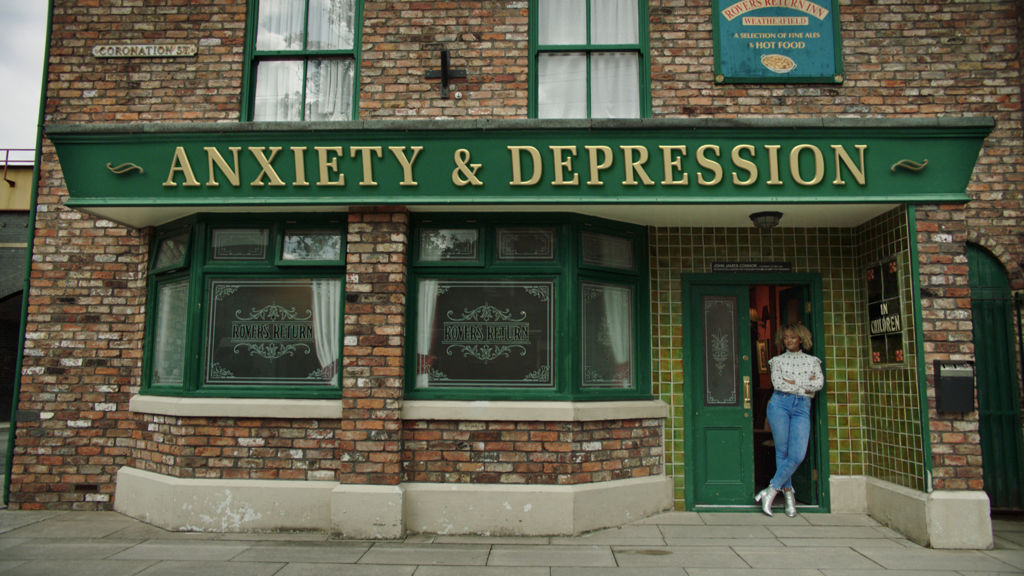
Credits
powered by
- Agency Uncommon/London
- Production Company Pulse Films/London
- Director Nez
- Editing Speade
- Grade Raised By Wolves
- Audio Post Soundtree Music
- Producer David French
- Editor Rich Woolway
- Edit Producer David French
- DP Harry Wheeler
- DP Spike Morris
- Colourist Vic Parker
- Post Producer Jon Hollis / (Post Producer)
Above: A host of ITV stars used a silent ad break to convey a powerful message.
The Tune Back In ad, featuring silent celebrities, had quite a meditative effect, it’s rare to see a quiet Jonathan Ross, for example. Can you tell us how Nez, the director of these spots, approached the brief?
Peacock: Nez had a creative task to really draw the eye to read the simple scripted messages woven into the celebrity context environments. For example, Alexandra Mardell standing outside Corrie’s The Rover’s Return. Nez shot with us in a variety of situations, contexts and pressures to capture the film over a period of some 10 days across the country.
Jonathan Ross was actually filmed in front of a live studio audience, mid-show. So, that was a new one for all of us!
Nez is a gifted talent, and he has a natural flair for very quickly putting people at ease. He also sometimes shot under atypical circumstances. For example, Jonathan Ross was actually filmed in front of a live studio audience, mid-show. So, that was a new one for all of us! We had a lot of fun capturing this film and Nez has since gone on to shoot more work for Britain Get Talking .
Credits
powered by
- Agency Uncommon/London
- Production Company ITV
-
-
-
Unlock full credits and more with a Source + shots membership.
Credits
powered by
- Agency Uncommon/London
- Production Company ITV
- Editor Work Editorial/London
- Post Production Absolute
- Sound Design Wave Recording Studios
- Talent Declan Donnelly
- Talent Anthony McPartlin
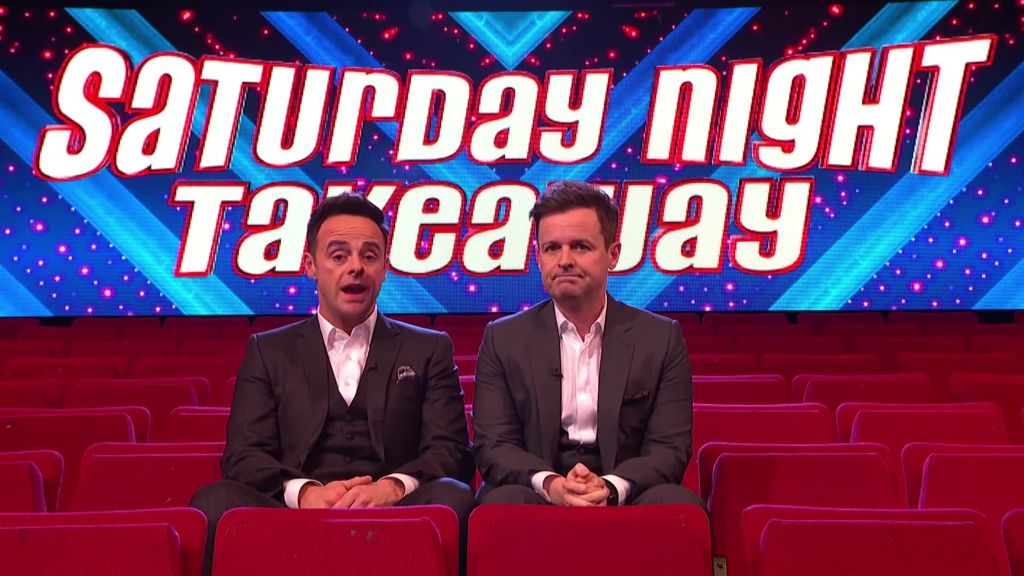
Credits
powered by
- Agency Uncommon/London
- Production Company ITV
- Editor Work Editorial/London
- Post Production Absolute
- Sound Design Wave Recording Studios
- Talent Declan Donnelly
- Talent Anthony McPartlin
Above: Ant & Dec's Message to the Nation addressed the nation a few days before the UK entered its first lockdown.
ITV needed to swiftly absorb the increased challenges to mental wellbeing caused by lockdown. How was the creative tweaked for Ant and Dec’s Message to the Nation in March?
Peacock: We were working on a new campaign for May Mental Health Awareness Week. The focus was around how we are all leading very busy lives, rushing around and needing to create more space to talk. An insight that, as we were heading into lockdown, would swiftly become not only regrettably incorrect, but also inappropriate.
We felt we had more than just a tactical creative opportunity on our hands, it was a serious responsibility for a public service broadcaster to do its part in comforting the nation.
The week prior to national lockdown in March 2020 we got together via one of our first ever team Zoom calls, realising the writing was on the wall. Businesses were sending staff home and the country was about to face something that we’d never experienced. To that end, we felt we had more than just a tactical creative opportunity on our hands, it was a serious responsibility for a public service broadcaster to do its part in comforting the nation through this terrifying time ahead. It was clear that tackling loneliness and taking care of our mental wellbeing was going to be more important than ever before.
We proposed ITV give over as much promotional media air-time as possible to the public in the pandemic. We wanted to offer them a unified voice that they so needed, executed under the creative campaign of Apart. But Never Alone. So, whether it be a message of ‘thank you’, ‘I miss you’, ‘I love you’, or a ‘Happy Birthday and sorry we can’t be together’ - whatever they wanted to say, we would broadcast it.
Not only did this campaign require a whirlwind new creative strategy signed off, it also required us to develop a robust production process to deliver on a methodology we hadn’t explored before.
Not only did this campaign require a whirlwind new creative strategy signed off, it also required us to develop a robust production process to deliver on a methodology we hadn’t explored before (putting the public on TV in such high quantities) - all done via remote working. We led a bespoke team at Uncommon Creative Studio, dedicated purely to making as many campaign assets, as fast possible, for TV and social.
On Saturday 21st March Ant & Dec filmed a special message in an eerily, empty Saturday Night Takeaway studio, broadcasting to 9.5 million viewers, reminding us it’s never been more important to talk, and to start sending in these messages of support. This was the last day Ant & Dec filmed in a studio for months. On Monday 23rd March Boris Johnson announced we were in national lockdown.
We wanted to reflect the unifying sentiment that we were all in this together.
Phillips: During the initial few weeks of lockdown we broadcasted 300+ messages, featuring 350+ members of the public. This included 171 ads on Easter weekend alone, one of the first truly challenging moments in the calendar we faced away from our families. Every Saturday we aired a 90-second celebration montage featuring celebrities including McFly, Jonathan Ross, Phillip Schofield and Holly Willoughby, Ed Westwick, and Gordon Ramsey next to members of the public. We wanted to reflect the unifying sentiment that we were all in this together. We also updated our channel identity and launched print campaigns prompting people to pick up the phone. As the campaign progressed, we started to ask people to also extend their thoughts beyond their close inner circle and really think of people that may be struggling and could really benefit from a chat.
Credits
powered by
- Agency Uncommon/London
- Production Company ITV
-
-
-
Unlock full credits and more with a Source + shots membership.
Credits
powered by
- Agency Uncommon/London
- Production Company ITV
- Editor Work Editorial/London
- Post Production Absolute
- Sound Design Wave Recording Studios
- Talent Davina McCall
- Talent Dolly-Rose Campbell
- Talent Gordon Ramsay
- Talent Michelle Hardwick
- Talent Sam Aston
- Talent Lisa Riley
- Talent Susanna Reid
- Talent Chris Bisson
- Talent Ben Thompson
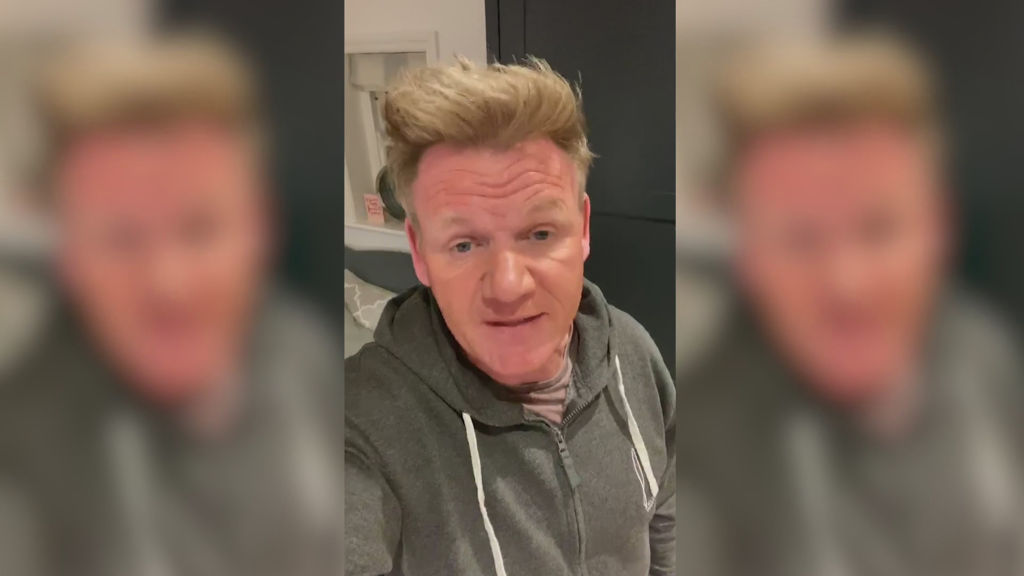
Credits
powered by
- Agency Uncommon/London
- Production Company ITV
- Editor Work Editorial/London
- Post Production Absolute
- Sound Design Wave Recording Studios
- Talent Davina McCall
- Talent Dolly-Rose Campbell
- Talent Gordon Ramsay
- Talent Michelle Hardwick
- Talent Sam Aston
- Talent Lisa Riley
- Talent Susanna Reid
- Talent Chris Bisson
- Talent Ben Thompson
Above: The campaign's Apart But Never Alone spot encouraged the people of Britain to keep talking.
Given that it could be said that advertising is, to a certain degree, in the business of mind control, do you think brands and their marketers have an increased moral responsibility to also consider the wellbeing of the consumers’ minds?
Peacock: One of the first questions we ask ourselves at Uncommon is ‘what makes this brand matter?’, or ‘why does this brand deserve to exist?’ We are obsessed about identifying a brand’s place in culture and doing something powerful and meaningful with it. Fortunately for us, working with a nationally-treasured broadcaster, ITV has a creative and moral opportunity to do the right thing aplenty. This underpins so much of our work we have done to-date. For example, the Diversity press ad that ran last year. Not only do ITV have the desire and drive to make a real difference, they are not afraid to pull things off with serious scale and impact.
One of the first questions we ask ourselves at Uncommon is ‘what makes this brand matter?’, or ‘why does this brand deserve to exist?’
Phillips: Advertising has always had the ability to go bigger than the tangibles of what it’s selling. We have always had the power to attach bigger ideas to the things we talk about. And that’s a lot of responsibility because, done without empathy or honesty, it can create a great deal of harm to the world. We turned our airtime into one of the strongest tools for raising awareness for mental health, continuing to put social purpose at the heart of the channel. We wanted to show that ITV was ‘More than TV’, it could change culture for good. This work successfully became the UK’s most recognised mental health campaign during the pandemic. At a time of isolation, keeping in touch and talking to one another, was so important for our mental wellbeing.
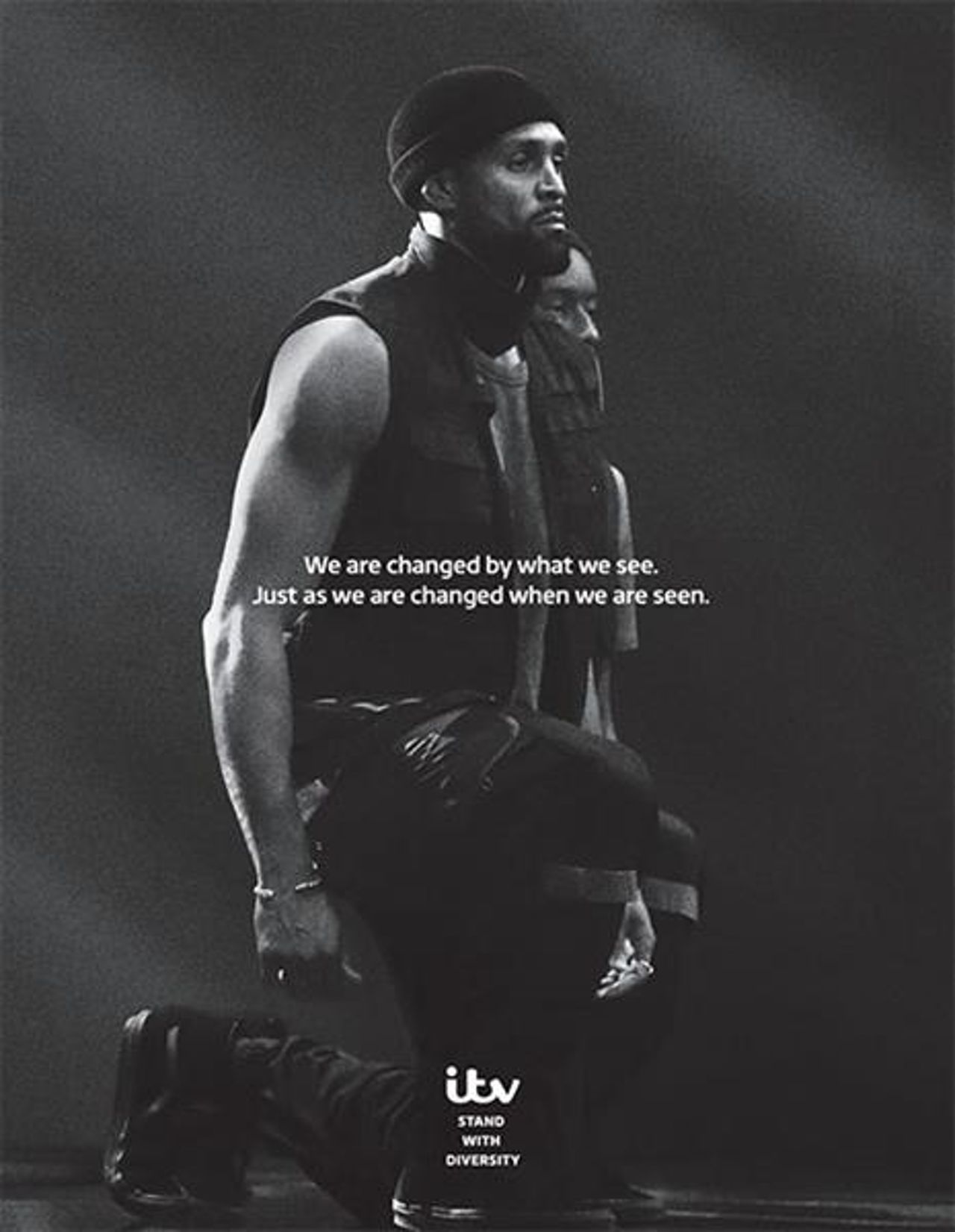
Above: ITV's full-page advert in support of dance troupe Diversity's Black Lives Matter-supporting routine performed on the channel's Britain's Got Talent show.
2021 kicked off with the campaign urging people to keep up the momentum of New Year's messaging and keep talking; what future plans does Uncommon have for the initiative?
Peacock: We are so encouraged by all of the amazing results and feedback for Britain Get Talking to-date. However, we are not complacent. Behaviour change takes time and dedication. Furthermore, the charity Mind recently said that today we live in what can only be described as a “mental health emergency”. As far as we are concerned there’s still so much work to be done. We are building an exciting plan for 2021 and beyond, so watch this space.
Mind recently said that today we live in what can only be described as a “mental health emergency”. As far as we are concerned there’s still so much work to be done.
Phillips: It’s not just about one in four of us having a mental health issue every year, we want all of us - the four in four - to proactively take care of our mental health. We’d love to see more funding going into mental health services but also people feeling they have the skills and knowledge to actively take care of their mental wellbeing.
)

